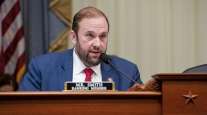Senior Reporter
Vote to Approve Yearlong Highway Law Extension on Senate’s Agenda
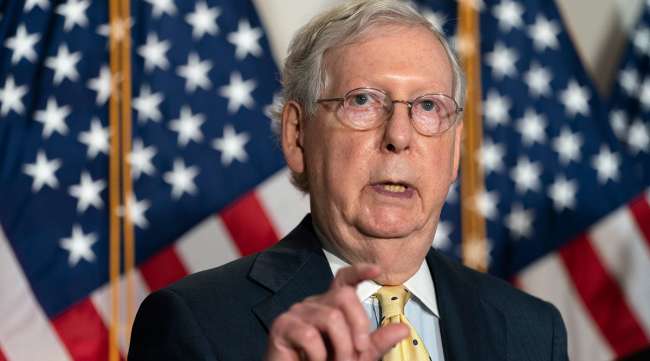
[Stay on top of transportation news: Get TTNews in your inbox.]
The extension of the soon-to-expire law governing the country’s highway policies is before the U.S. Senate as part of legislation meant to avert a partial shutdown of federal agencies.
Senators are aiming to beat a Sept. 30 deadline to advance a House-passed bill that would ensure funding for the federal government, including most operations at the U.S. Department of Transportation.
Tucked in the funding bill is the yearlong extension of the 2015 FAST Act, a five-year highway law that also expires at the end of the month.

Home | Video | Heroes' Photo Gallery
Saluting the men and women of the trucking industry who kept America's essential goods flowing during the coronavirus pandemic.
Heroes: Peter Lacoste | Susan Dawson | James Rogers | Reggie Barrows | Kevin Cooper | Cesar Quintana Moreno
Kentucky Republican Sen. Mitch McConnell, the chamber’s leader, has scheduled the funding bill’s consideration for sometime prior to Sept. 30. A vote to keep the federal government functioning and avoid disruptions to federal highway operations would clear the way for floor consideration of President Donald Trump’s Supreme Court nominee, he argued. The president indicated that before the November elections, he would name a replacement to Justice Ruth Bader Ginsburg, who died Sept. 18.
“There is one right path before us. It does right by the judiciary, the Senate, the yet-unnamed nominee and the American people. It is a fair hearing, a fair process and a fair vote,” McConnell said Sept. 23. “That’s what the American people ensured in 2018, after the Democratic Leader [Sen. Chuck Schumer] explicitly asked for a referendum on his approach to the judiciary.”
On Sept. 22, the House, by a vote of 359 to 57, advanced the temporary funding measure, which would keep major parts of the government functioning through Dec. 11. Besides the highway law’s extension, the measure would fund several social programs.
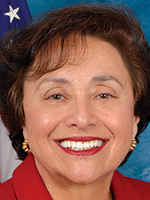
Lowey
House Appropriations Committee Chairwoman Nita Lowey (D-N.Y.) led the chamber’s approval of the fiscal 2021 transportation funding bill. She also led the passage of funding bills for other departments and agencies. She criticized Senate Republicans for not proceeding with a schedule of their fiscal 2021 funding bills. The Senate’s inaction helped to set up the need for a temporary funding measure.
“The House did its work, but Senate Republicans failed to begin the appropriations process, sadly making a continuing [funding] resolution necessary to avoid a devastating government shutdown,” Lowey said. “This [continuing resolution] reflects bipartisan agreement and includes nearly $8 billion in desperately needed nutrition assistance for struggling Americans.”
In the fiscal 2021 House-passed transportation funding bill that the Senate did not get to, the Federal Motor Carrier Safety Administration would receive $881 million for its operations. The proposed allocation would be a $202 million increase from the fiscal 2020-enacted level, and $179 million more than the president’s request. The bill also would ensure the solvency of federal infrastructure grants.
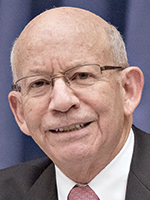
DeFazio
Extending for 12 months the provisions under the FAST Act highway law was a move endorsed by the top transportation policymakers on Capitol Hill. Rep. Peter DeFazio (D-Ore.), chairman of the transportation affairs committee, referred to the extension as a legislative tool for lawmakers to “continue work on a long-term, transformational bill that significantly boosts investment in our surface transportation network and moves our transportation systems into the 21st century.” Earlier this year, DeFazio advanced a multiyear update to the FAST Act.
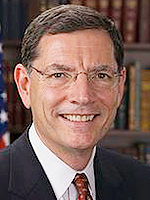
Barrasso
“It’s critical that states and communities be able to plan for long-term highway projects,” added Sen. John Barrasso (R-Wyo.), chairman of the upper chamber’s committee on highways. Barrasso also led his panel’s approval of an update to the FAST Act. “That’s why I insisted the continuing [funding] resolution include a full one-year extension of highway funding. Month-to-month extensions don’t provide the certainty states need. We must make sure local governments can move forward with the construction projects that keep our economy moving.”
Across the transportation landscape, groups representing various interests have called on Congress to clear for Trump the highway law’s extension, arguing doing so would help to avoid certain operational disruptions. Groups representing state agencies, as well as freight and transit stakeholders continue to press for emergency federal aid.
“Additional funding is necessary to prevent further delay and/or cancellation of projects due to the impact of the pandemic on transportation revenues,” observed K.N. Gunalan, president of the American Society of Civil Engineers.
Want more news? Listen to today's daily briefing:
Subscribe: Apple Podcasts | Spotify | Amazon Alexa | Google Assistant | More




